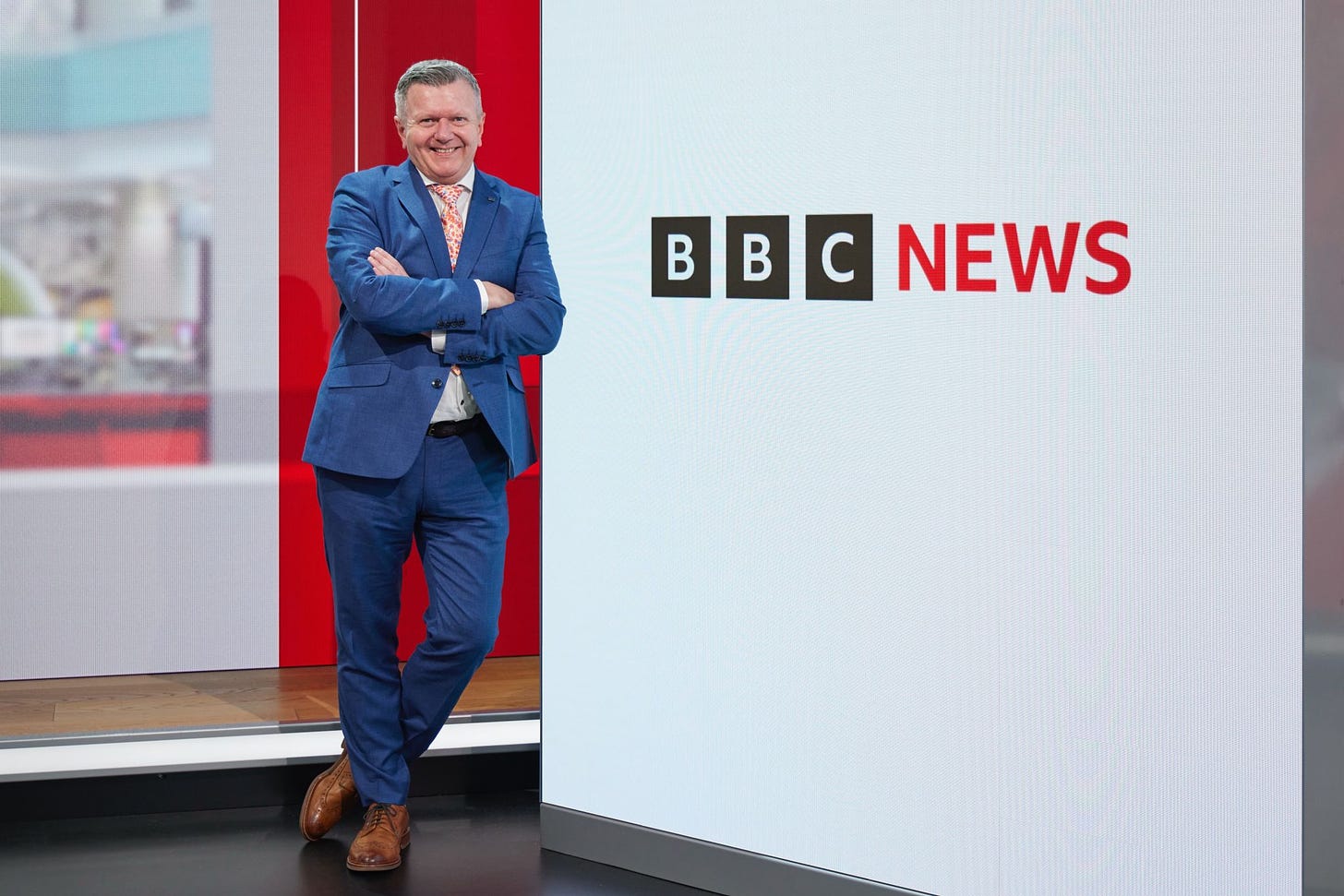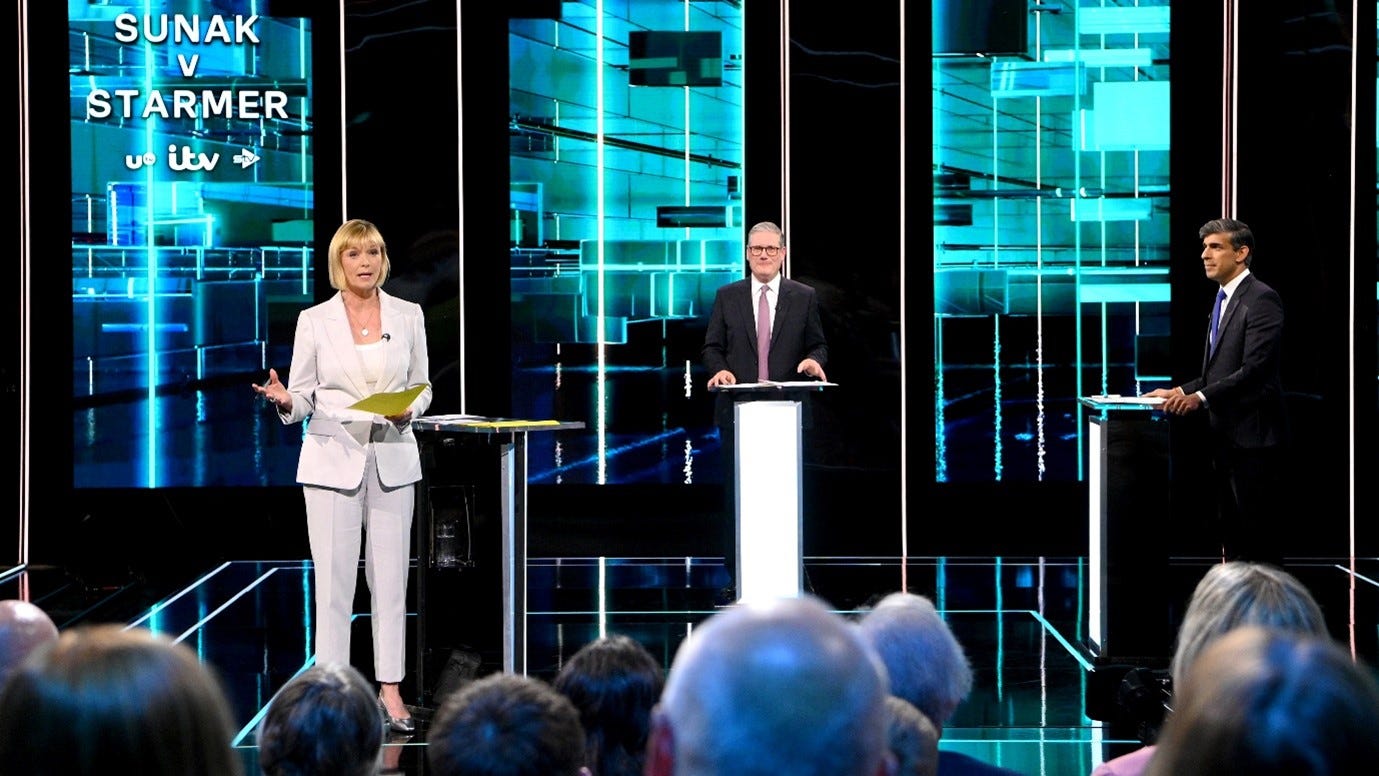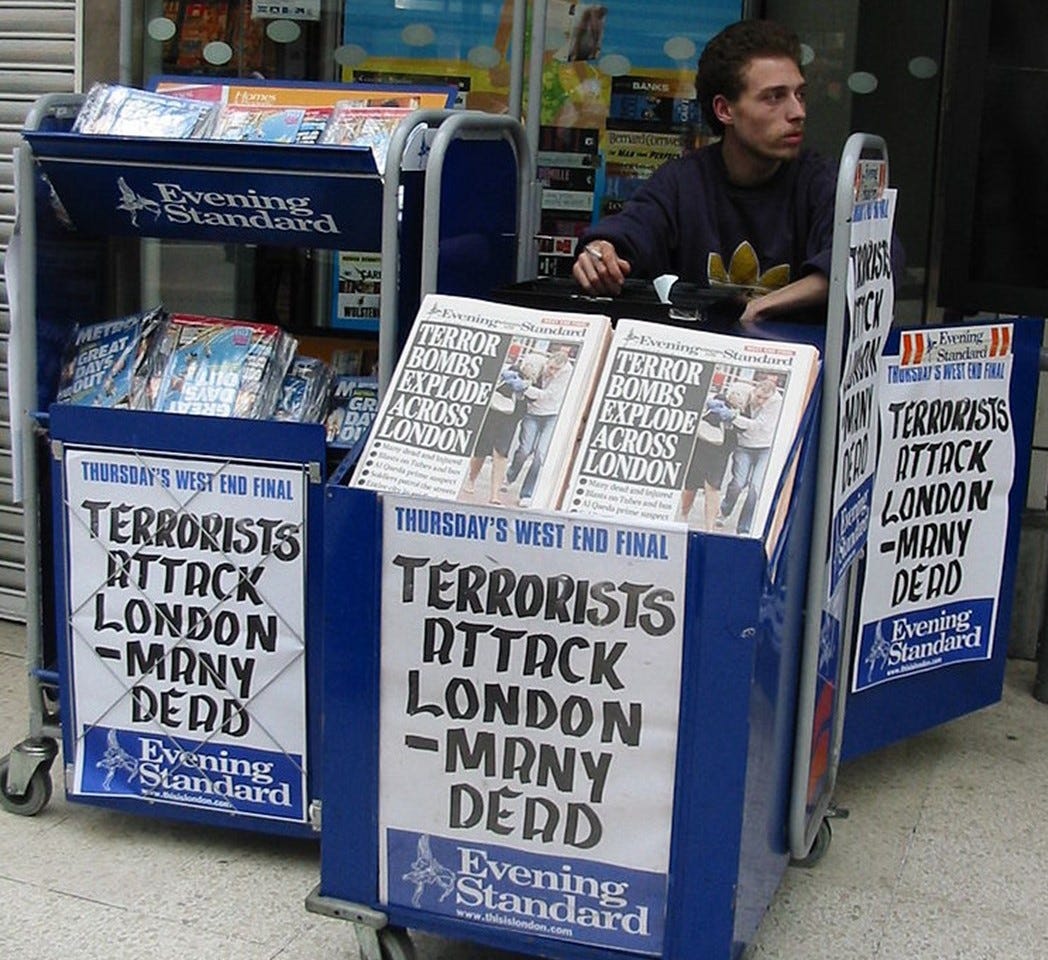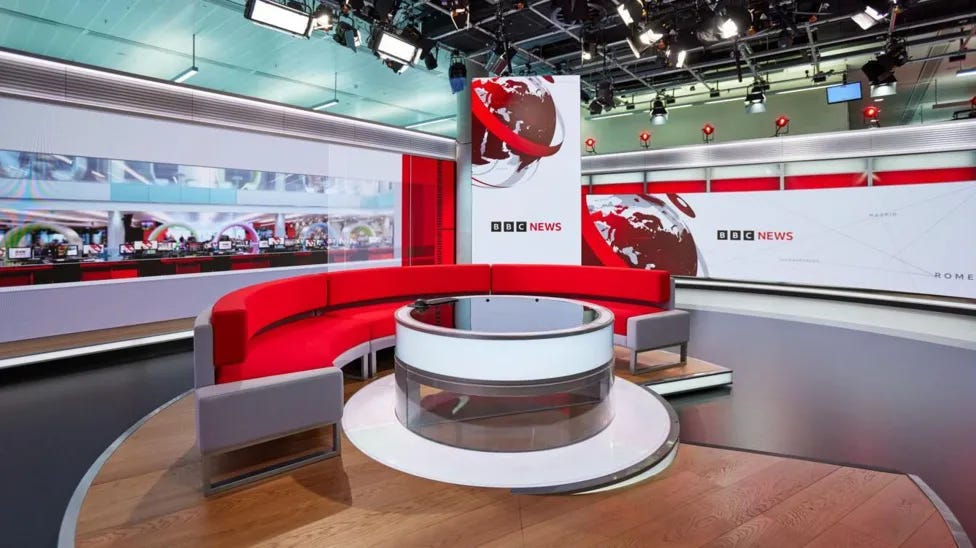June 2024: a TV Election, the end of the daily Standard, and BBC News on the move
Thoughts on TV News, journalism, and digital media. Issue#5
Welcome to my latest Substack newsletter. I’m a former TV news journalist, turned digital and media executive. In this edition, I’m looking back at three big events in June 2024 - the UK election debates, the demise of a famous London daily newspaper, and BBC News moving their lunchtime news to Manchester.
Old fashioned legacy linear TV - centre stage in the 2024 UK election
It’s difficult for those outside the UK to appreciate that TV leaders’ debates in the UK only started in 2010 – decades after they became normal practice in the US.
I played a small role in trying to introduce them to the UK when I worked at ITN1 and represented the commercial TV channel ITV in negotiations with the political parties in 1997. In March of that year, the then Prime Minister John Major said he would welcome a TV debate. This sparked off a series of negotiations between the parties and the broadcasters.
The Director of BBC News at the time, Tony Hall, and the BBC’s Chief Political Adviser Anne Sloman negotiated for the BBC, while ITV’s Marion Bowman and I argued the case for ITV. I remember we met Labour’s Lord Irvine in his legal chambers for one set of negotiations.
We nearly pulled it off, but the Blair camp, in the end, decided a debate was too risky when they had such a strong advantage in the polls, leading the Conservatives to pay an actor to appear at Tony Blair’s public appearances dressed up as a chicken. Happy days!
It’s astonishing, really, that it took a further 13 years before the debates finally took hold in the UK. We may have been late to the game, though, but TV debates are now undoubtedly an integral part of the UK election campaign landscape.
We’ve had a series of debates on ITV, Sky and the BBC in this election – some just with two main leaders, others with leaders from the seven main parties.
To analyse the debates, let’s break them down into the five key elements for any TV debate programme: impact, influence, production, format and moderation.
The programmes certainly had impact. The first one on ITV, for example, was the front-page story of most of the following day’s newspapers. From The Telegraph’s “Starmer on the ropes over Tax”, to the Daily Mail’s: “Fiery Rishi comes out swinging - and lands big blows”. Sunak’s claim during the debate that Labour’s tax plans would cost £2,000 per household became the first big issue of the campaign. The other debates had a similiar impact on the tone and course of the campaign. So, impact? Without a doubt.
I think that the debate programmes will also have had a significant influence on undecided voters. I do think it’s fair to argue that a general TV audience will include a higher proportion of undecided viewers than social media platforms – and those viewers will undoubtedly have been influenced by the content and style of the debates.
In terms of technical production, the ITV programme was pretty faultless. A nicely designed set, good vision mixing, lighting, and sound. The camera angles on the leaders, on Julie Etchingham and the audience all worked. This was a live programme, and I didn’t see any glitches. The BBC and Sky debate production was also of a high quality. I liked the way the Sky set changed colour from red to blue for the different leaders – although, perhaps, the BBC leaders’ set had less flexibility with lighting and camera positions, as it was working within the confines of the BBC’s radio studio.
The format? Well, for the first debate, with its time limit on answers, this became a controversial talking point. But the limit on answers at least allowed the ITV programme to cover most of the key issues in the election – tax, the NHS, Gaza, education, security and immigration. ITV would have been criticised if it had left any of those topics out. And the use of audiences in all of the debates has definitely been a plus – with some of the most challenging questions coming from members of the audience. The main problem for the ITV and BBC debates was the leaders talking over each other. Rishi Sunak did a lot of interrupting in the first debate – and Penny Mordaunt and Angela Rayner did an amazing double act of talking over each other in the BBC and ITV debates. But in many ways that was part of the mission of these programmes – to see how the leaders behaved within the constraints of the format.
And finally, how did the moderators do? Firstly, this must rank as one of the most difficult jobs if not the most difficult job in TV presenting. Keeping the Prime Minister of the country and the leader of the opposition within the bounds of an agreed format cannot be easy. In my view, ITV’s Julie Etchingham and the BBC’s Mishal Husain both did well in their debates – running the debate in a dignified and respectful way. A lot of people on social media criticised Beth Rigby’s more assertive and interrupting approach on the Sky News debate – but I appreciate that others warmed to that style.
At the start of the campaign, there was talk of this being the TikTok election. The FT’s Stephen Bush wrote an article with the headline; “This will be the first post-TV election”, with the sub-heading, “The challenge for political parties is that televised set-piece events reach fewer people than ever before”.
But my contention is the opposite of this. Despite them being broadcast on legacy media, the live debates and the one-on-one TV interviews on the main, old-fashioned linear TV channels were centre stage in this election, and shaped much of the agenda and direction of the campaign.
What went on in TikTok and Facebook was obviously important. Newspapers still had a big influence. Political podcasts had a new and interesting role. But the 2024 UK election campaign, I would argue, was very much a TV-dominated event.
Farewell to the daily London Evening Standard
For anyone brought up in London, or who worked or lived in the city during the 1970s to the 90s, the decision by the Standard to stop producing a daily newspaper is such a poignant sign of the times.
I can remember so clearly the underground tube compartments filled with people reading the Standard, and station entrances crowded with newspaper vendors shouting out ‘Standard, Standard’. All now gone – replaced, of course, by mobile phones and the growth of other digital outlets.
The decision to scrap the daily edition was announced at the end of May 2024, with job losses announced in mid-June. It’s sad that this is happening just 3 years from the 200th anniversary of the founding of the paper in 1827.
Two articles are well worth reading for those interested in its demise.
Earlier this month, the UK Press Gazette published an updated piece by Stuart Kuttner, former Evening Standard news editor in the 1970s, originally written in June 2017.
It recalls an era of the London newspaper in which its paid circulation ranged from 600,000 to 800,000 daily. What struck me about the article was the list of extraordinary people working for the paper in those years – editor Charles Wintour, political editor Robert Carvel, reporter Max Hastings, Sam White in Paris, theatre critic Milton Shulman, film critic Alex Walker, the cartoonist JAK. All big figures in my memory as I grew up in north London, reading the Express in the morning, and the Standard in the evening.
Stuart ends his article with a lovely paragraph that captures that era:
“Nothing beat the sheer exhilaration of being first and best in Fleet Street’s 24-hour unique drama. It was a privilege to be part of that breathless, elitist, golden time.”
Then on the 13th June, the i newspaper had an insider’s account of the decision to go weekly. The article said that the Standard had losses of £84.5m over the last six years, but the paper’s owner Evgeny Lebedev had shied away from making it a digital-only publication, as he had done with The Independent.
There is no date yet for the launch of the newly proposed weekly Standard, expected to come out each Thursday or Friday. The article quotes media analyst Alex DeGroote as saying:
“It seems hard to believe a city of London’s size cannot sustain a daily newspaper. But that is the reality… A weekly successful Standard product will be hard to edit and publish. An integrated media model with events and paid-for newsletters may be the way forward… The Standard brand has to be made relevant for 2024.”
On a family note, my brother Paul, of course, was the editor of the Evening Standard in 1991. He was only there for just over a year before moving to the Mail. It was the first newspaper that he edited, and circulation rose by 16% during his time there. I spoke to him last week, and he was clearly saddened about what has happened to a once great and powerful newspaper.
BBC Moves Lunchtime News to Manchester
I was interested to see that the BBC has moved its lunchtime news programme, News at One, to Salford in the north of England – making it the BBC's first daily network TV news bulletin to be produced and broadcast from outside London. They are also extending the programme to an hour.
The BBC said the move was part of its aim “to shift power and decision-making across the UK” and better "reflect, represent and serve" audiences.
All well and good, but lunchtime news programmes specialise in responding to breaking news stories – and getting live interviews with the top newsmakers of the morning. I was editor of ITN’s News at One back in the day, and I can tell you that is no small task.
But it will help the BBC that the post-Covid world of TV News has been transformed by Zoom and remote interviews. Doing a down-the-line interview from another studio used to be seen as second place to getting someone live into a studio. But I think it’s interesting that remote interviews often work really well – with the interviewer and the interviewee both looking straight at the viewer. No awkward studio two-shots. A direct visual interaction with the viewer at home. Zoom interviews, in my view, are often more personal than those in the studio.

So, good luck to the BBC News at One production team in their new home. Their editor, a former colleague of mine from ITN days, Richard Frediani (see photo above), posted on LinkedIn:
“Two weeks gone and reflecting with huge pride at the incredible teamwork that launched the hour-long BBC News at One in Salford on Monday June 3rd 2024. The first weekday network news bulletin produced and presented outside London. Only possible because of the commitment, creativity and sheer hard work of a team that I’m proud to work alongside.”
Always good to see TV News launches going well!
Quote of the Month
“We are losing large amounts of money. Your audience has halved in recent years. People are not reading your stuff. I can’t sugarcoat it anymore.”
Will Lewis, Washington Post Publisher, during a newsroom briefing on Monday, June 3rd.
Worth reading …
ITN has become the first UK news organisation to announce a deal seeking to safeguard its archive from the threat of AI, by using blockchain technology to validate news footage. (The Press Gazette)
Podcast reach among UK adults hits an all-time high - 42% of adults are monthly podcast listeners and 30% are weekly listeners. (Podnews)
Daily Mail plans to debut a dozen YouTube shows in 2024 in a long-form video push. (Digiday)
The UK media regulator Ofcom marked its 500th anniversary of its Broadcast Bulletin by publishing its top 10 most complained about programmes of all time. (Ofcom)
One of many articles in June about British editors taking over US titles. In 'Fleet Street is colonising the American newsroom'. Kara Kennedy argues it's partly because British print journalists specialise in "hard-nosed, scrappy journalism on shrinking budgets". (The New Statesman)
Thanks for reading The News Angle! Subscribe for free to receive new posts.
Footnotes:






